The Duke Global Health Institute community comprises more than 300 faculty and staff, working across a range of disciplines and bringing diverse skills to advance the institute’s mission. In our faculty/staff newsletter, Insider, we highlight members of our community through these “Faces of DGHI” features. This page includes present and past profiles, offering a way to get to know the interests and passions of some of the people who make the institute’s work possible.
Dennis Clements
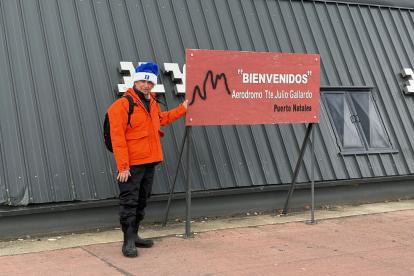
Dennis Clements, wearing a Duke Santa...
Dennis Clements, M.D., MPH, is a professor emeritus of pediatrics and adjunct professor of global health. Clements’ time at Duke began in 1973 in pediatric residency and for 22 years, he was the division chief of primary care pediatrics. He has lived in 18 different places across the U.S. and the world including Alabama, California, Japan and Switzerland. After more than 40 years at the university, Clements announced his retirement this year with his final day being June 30.
I’ve worked at DGHI for…
since 2007, but I’ve been at Duke since 1973.
The most rewarding part of my work is…
hands down, working with students. I’ve been teaching two courses each semester since 2007 including the Global Health Capstone Course for undergraduate students. The students are our future and we need to invest in them. I was the director of undergraduate studies for at the institute and on the executive committee for Directors of Undergraduate Studies for a decade, which allowed me to partner with many faculty members across the university.
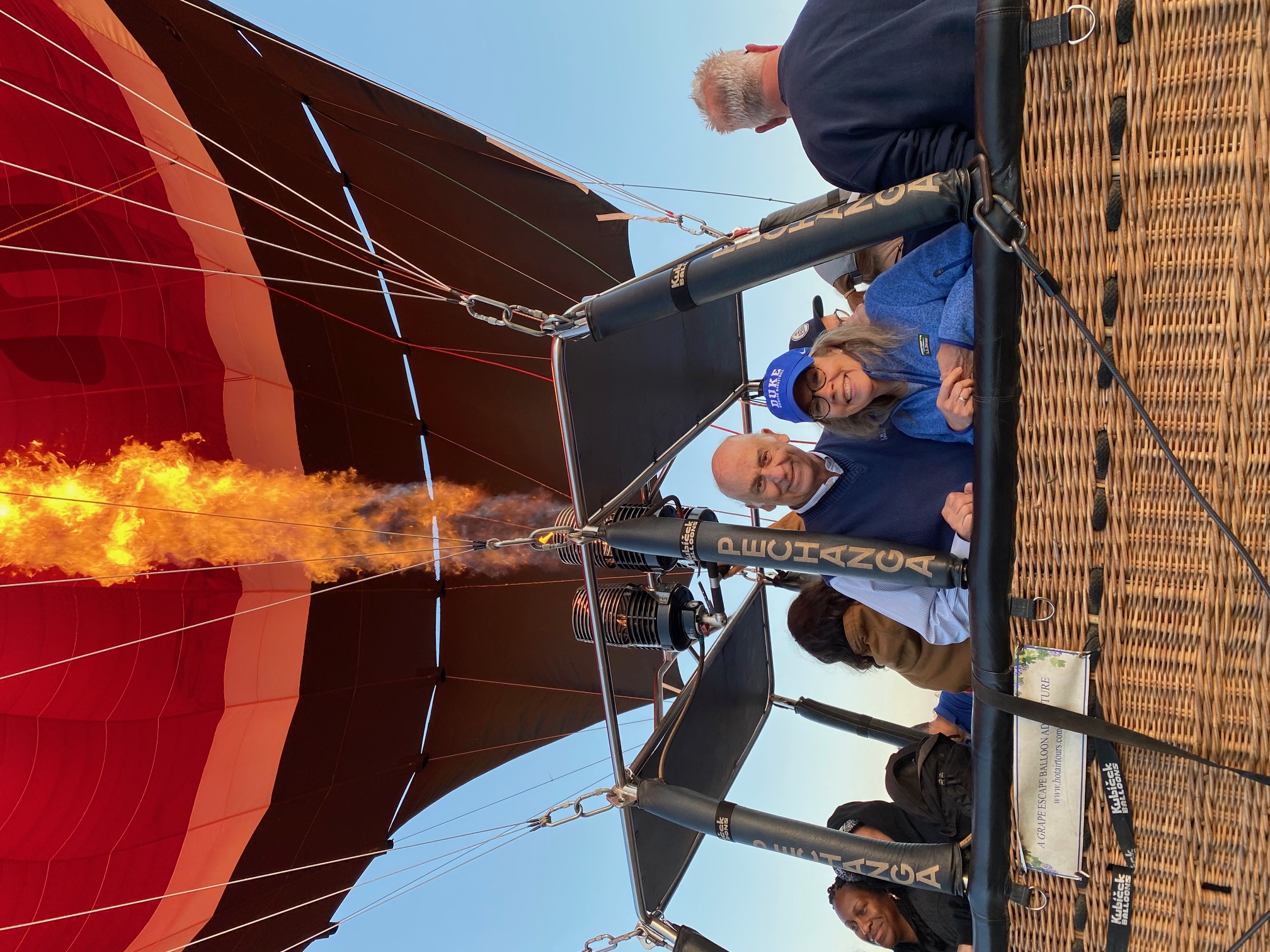
I feel passionate about...
creating a positive atmosphere for the future of everyone. My travels across the world convinced me that except for the chance of where we were born and into which social situation we find ourselves, we are all the same and should have the same options for success and happiness in life.
The most memorable experience I’ve had through my job…
was being named the Global Health Undergraduate Professor of the Year at DGHI’s Commencement Ceremonies in 2014 and 2022. I was nominated by students.
Something people may not know about me…
I have been a certified flight instructor for 50 years, and I have more than 3,000 flight hours. I was a flight surgeon in the US Air Force from 1976 to 1978. I flew myself from Chapel Hill to Prestwick, Scotland in a Single Engine Plane in 1985. That experience allowed me to fly the Pacific to see some of the world’s most idyllic locations and fabulous people.
If I’m not working, I am likely…
working in the garden, flying, diving or taking pictures.
What I value most about DGHI:
I was on the committee that designed DGHI and selected our first director. We have a wonderful group of people who care about making the world a better place for everyone.
Jason Barnette

Jason Barnette is an IT Analyst with the Office of Information Technology, providing support for the institute, the Center for Health Policy & Inequalities Research and the Testing Center, all housed in Trent Hall. Barnette is originally from New Orleans. Naturally, he’s a fan of the New Orleans Saints and the Louisiana State University Tigers.
I’ve worked at DGHI for…
a little more than two and a half years. I also work with the Security Office and Research Teams to approve research security data security plans for IRBs.
The most rewarding part of my work is…
providing support for people who genuinely care about others and are doing valuable work throughout the world.
I feel passionate about...
my family, my job, technology and providing support to assist others in working more efficiently and effectively.
The most memorable experience I’ve had through my job…
the July 2024 global CrowdStrike outage that caused millions of Windows computers to crash and show the dreaded “Blue Screen of Death.” This required assisting each employee individually and manually. The first person I was able to help resolve this issue was the founding director of DGHI located remotely in NYC. While this global outage was a challenging situation, it was rewarding to help all the people who are doing important work back up and running.
Something people may not know about me…
I used to live in Breckenridge, Colorado, I love snowboarding and being outdoors.
If I’m not working, I am likely…
hanging out with my family, coaching my daughter’s soccer team, playing tennis or beach volleyball.
What I value most about DGHI:
I value the selflessness of the staff at DGHI. I enjoy supporting people who are making a difference all over the world. I enjoy going to Think Global events and learning about what each group does and the impact they are making.
Jane Claire Anderson
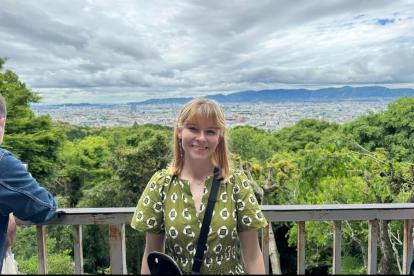
Jane Claire Anderson at the Fushimi...
Jane Claire Anderson is a grants and contracts administrator with the DGHI Grants Team. She oversees pre-award and post-award management. She previously held roles at the Center for Policy Impact in Global Health and the Center for Health Policy and Inequalities Research. Not only was she raised in Roswell, Ga., but in Charlotte Amalie, the capital city of the U.S. Virgin Islands.
I’ve worked at DGHI for…
nearly three years.
The most rewarding part of my work is…
when my research teams feel happy when I help them meet a deadline we didn’t think could be met!
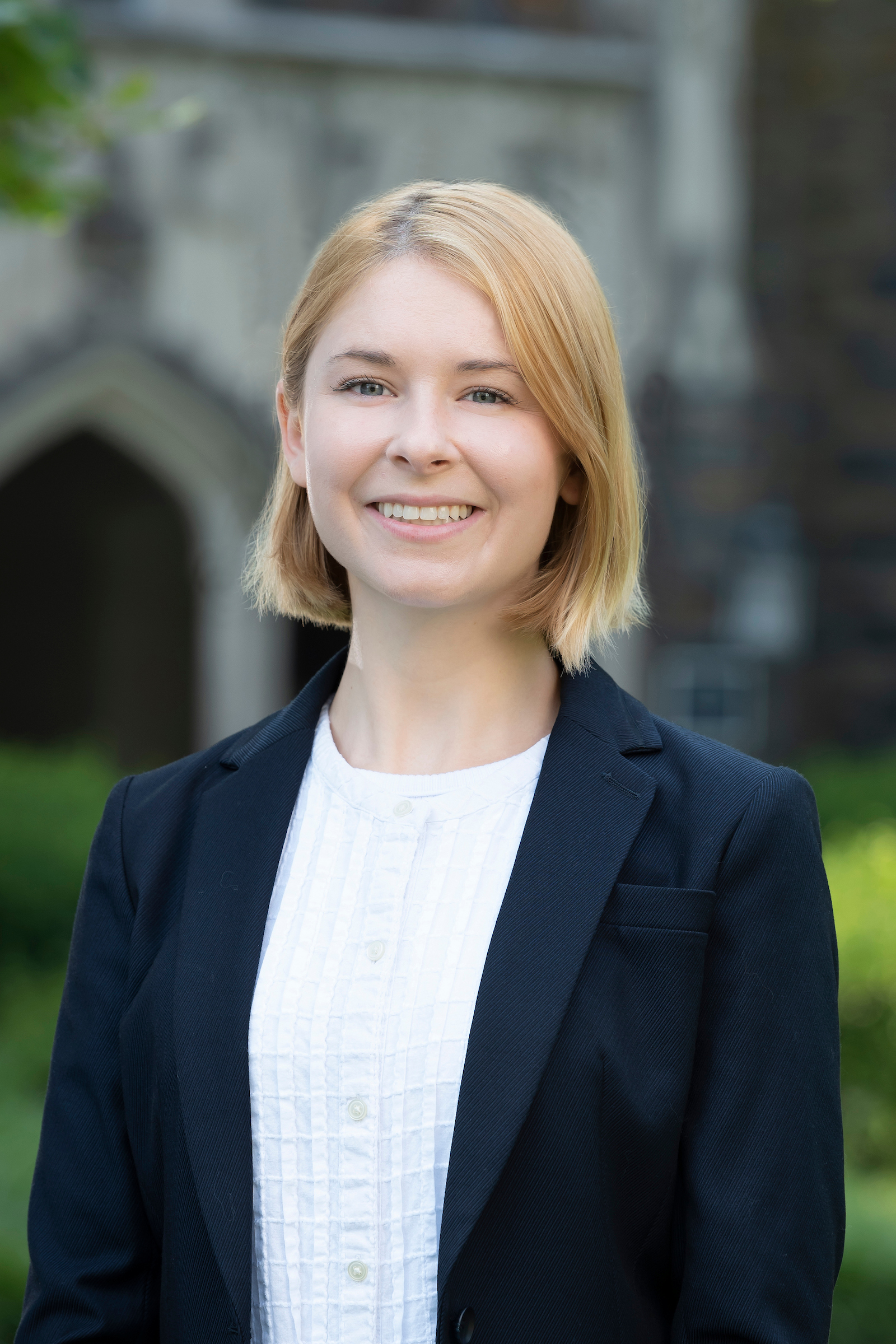
I feel passionate about...
access to equitable education.
The most memorable experience I’ve had through my job…
was a scheduled call with many people, Richard Horton (editor of The Lancet) and I were the first to log onto the zoom meeting. He and I were able to have a two-minute, one-on-one conversation. [At the time], I was a coordinator, but he was very friendly.
Something people may not know about me…
my first full-time job was as a lab technician at The University of Georgia’s Laboratory of Archaeology. I had fallen in love with everything about UGA’s anthropology program, and I think my professor saw this in class. One day, an archaeology professor emailed me the laboratory was hiring and asked if I was interested. I got lucky they were looking for students to hire.
If I’m not working, I am likely…
playing 7 Days to Die, or Civilization V, which are both computer games, and a board game called Terraforming Mars. It reminds me of “Monopoly meets Risk.” You play as a corporation trying to colonize Mars and make it livable. My friends and I play this game often and try to strategize the best for a different corporation.
What I value most about DGHI:
I feel valued as part of the community, even as just staff. I love learning anything I can about all of the research being done at the institute. I feel passionately about helping administratively on the projects in my portfolio.
John Gaines III
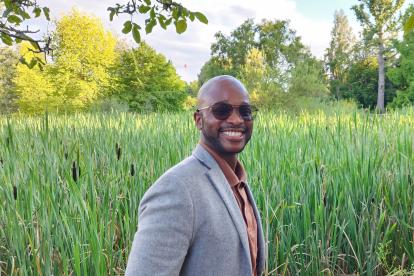
At DGHI, John Gaines III is the administrative assistant to the institute’s director, Chris Beyrer. His role includes maintaining liaison with all levels of administration, managing the director’s complex calendar and appointments while supervising and coordinating his travel schedule. Although Gaines is well-traveled, his first time visiting a country in Africa was with DGHI during the inaugural East Africa Partners Meeting in 2023.
I’ve worked at DGHI for…
for two years.
The most rewarding part of my work is…
to have a background seat and dive into the work that’s done that has inspired me to pursue an MPH with Boston University School of Public Health. I’m in my first year of the program and had the privilege to travel to different countries to assist Dr. Beyrer in Rwanda and the International Aids Conference in Munich, Germany, hosted by the International Aids Society (IAS), this past summer. Seeing the work that’s done behind the scenes at a global and local scale is rewarding.
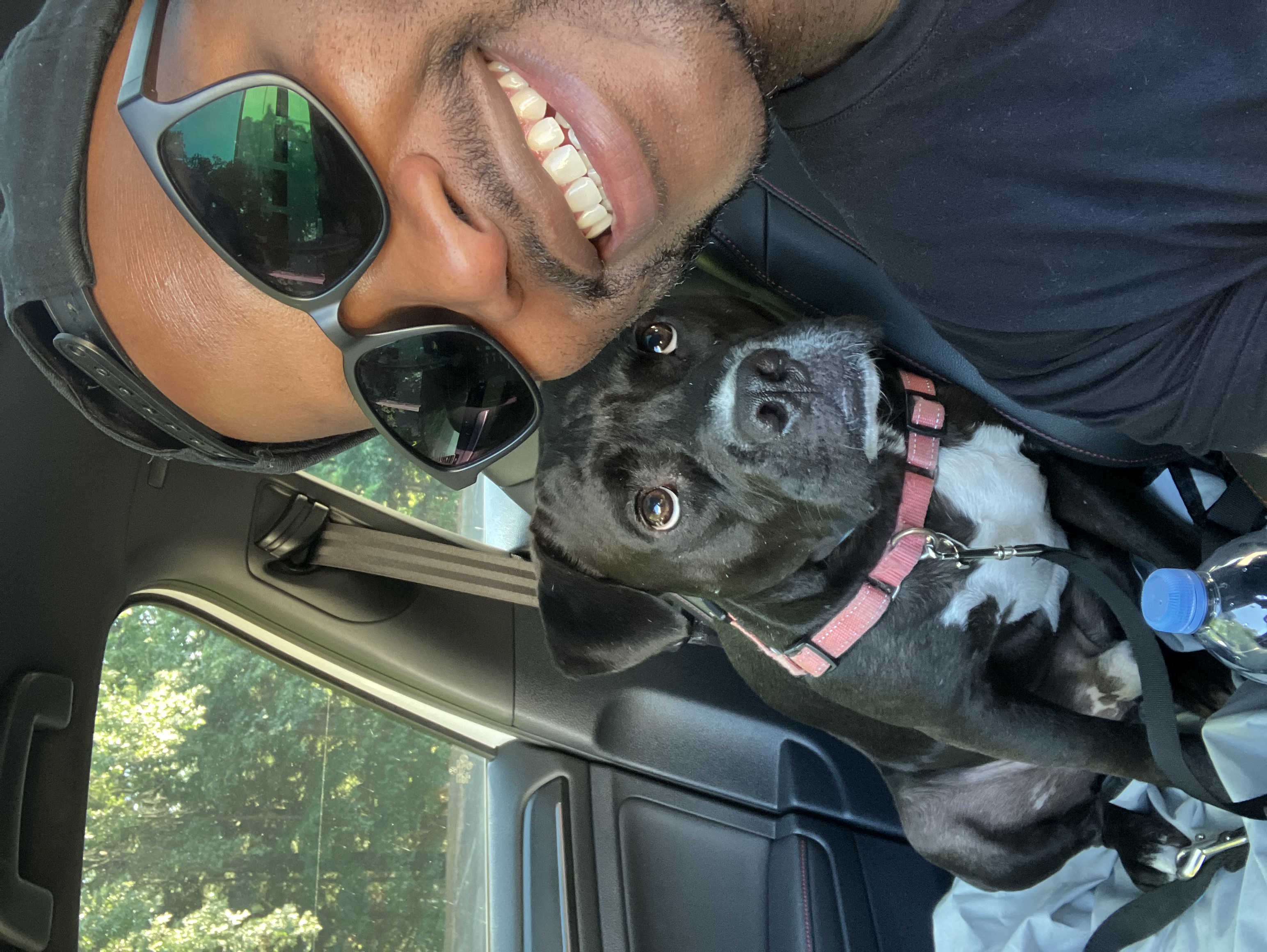
I feel passionate about...
my spiritual activities, my nieces and nephews (five boys and three girls) and my dog, Deklyn Pierre Gaines. Deklyn is five years old and a rescue from Wake County Animal Shelter. I’ve had him for three years, and he’s an American Staffordshire Terrier. Also, entering my home of peace and getting into bed after a long day.
The most memorable experience I’ve had through my job…
going to Africa for the first in 2023 where everyone looks like me, and I look like them. I had a cathartic experience – cleansing almost – by going to Rwanda. I went on an all-day tour of the city experience the culture and the food. I was really immersed in the culture.
Something people may not know about me…
I enjoy cleaning, collecting currency from different countries (I have currency from Rwanda, Euros from across Europe [Italy, Germany, Switzerland, etc.], Canada, Mexico and the United Kingdom.
I lived in Belgium and Germany for ten years because my dad was in the U.S. Army. Then, as a family, came back to the U.S., but I moved back to Germany from ages 20 to 28 on my own. While in Germany, I received my undergraduate degree from the University of Maryland in psychology.
If I’m not working, I am likely…
doing work for graduate school; this is my first graduate degree that I’m pursuing. I’m also involved with my religious activities and spending time at home.
What I value most about DGHI:
I'm grateful to have a mentor in Dr. Beyrer and appreciate the focus on global health. Also, that faculty and staff have their specialties and work in a range of areas such as cardiology, malaria, air pollution and more to achieve equitable, global health for all, especially for vulnerable populations who need it most.
Erin Durham
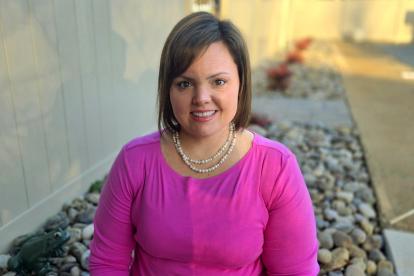
Erin Durham is a staff member with DGHI and serves as the department administrator for international guests visiting the institute. She provides visa support for foreign national employees for their work and study. For the Visiting Scholars Program, Durham helps scholars from DGHI partner institutions adjust to their time spent at Duke. Prior to DGHI, Durham worked at IBM in various roles from serving as an immigration administration specialist to a talent acquisition coordinator.
I’ve worked at DGHI for…
almost 5 ½ years.
The most rewarding part of my work is…
facilitating the visit of our partners in Durham. Often, our faculty have collaborated with partners worldwide without ever meeting them in person. In-person collaboration and training provide invaluable opportunities for individuals to return to their home institutions and create meaningful change in their communities. While I may not be in the field myself, knowing that I’ve played a small role behind the scenes in making this process possible is incredibly fulfilling.
I feel passionate about …
continuous learning and exploration. Whether it's tackling complex challenges or discovering new interests, I find joy in expanding my knowledge and deepening my understanding..
The most memorable experience I’ve had through my job…
was navigating the COVID-19 pandemic. I had been with DGHI for six months, just as I was starting to find my footing, when we were sent home in March 2020. While the world came to a standstill and speculation ran high, I had the unique opportunity to work alongside top health professionals and gain firsthand insight into the pandemic. This experience deepened my understanding of global health – locally and internationally – and was an invaluable learning opportunity.
Something people may not know about me…
I absolutely LOVE canning! While pickles are my specialty, I also can green beans, salsa, spaghetti sauce, pickled banana peppers, okra, jams and just about anything else we grow in our garden!
If I’m not working, I am likely…
spending time with my family. I have two daughters, ages 2 and 15, who keep me on my toes and always keep life interesting!
Armstrong Obale

Armstrong Obale is a Research Analyst I with the Hubert-Yeargan Center for Global Health. He has two graduate degree from the University of Buea in epidemiology and control of infectious disease and DGHI’s Master of Science in Global Health program. Prior to Duke, Obale volunteered for three years as a field coordinator in a nurse-led rural diabetes management project in his native country.
I’ve worked at DGHI for…
a year and six months. In my role, I do data analyses, data management, protocol management on iRIS and REDCap.
The most rewarding part of my work is…
is uncovering insights from data. It’s truly enjoyable to do something I’m passionate about. I am deeply committed to global health and equity, ensuring everyone has access to better health outcomes.

The most memorable experience I’ve had through my job…
is uncovering insights from data. It’s truly enjoyable to do something I’m passionate about. I am deeply committed to global health and equity, ensuring everyone has access to better health outcomes.
The most memorable experience I’ve had through my job…
has been contributing to the early stages of clinical research, which, I believe is creating an unforgettable first-time experience for me.
Something people may not know about me…
is how much I value sleep—I rarely trade my sleep, especially when I’m feeling tired.
If I’m not working, I am likely…
listening to YouTube videos, watching movies, or honing my piano skills.
What I value most about DGHI:
it’s truly “global” nature, with meaningful representation from around the world. I also admire how the building is thoughtfully designed to reflect a global feel, which adds to its unique charm.
Stephanie Ibemere

Stephanie Ibemere is an assistant professor at the Duke School of Nursing and associate director of the Nursing Center for Evidence Based Practice – IVAN Research Institute. In addition to these roles, Ibemere teaches in the Master of Science in Nursing program and has been involved in DGHI’s Master of Science in Global Health program as a committee member to students pursuing the degree. She is from Tulsa, Oklahoma and is a first-generation Nigerian American who was born to “tenacious and incredibly intelligent Nigerian parents.”
I’ve worked at DGHI…
since Fall 2022 when I joined as affiliate faculty.
The most rewarding part of my work is …
being part of social justice-oriented actions, which support the advancement of knowledge across the world. Particularly, I have and continue to find great joy in my work with colleagues in Nigeria and soon enough in Uganda focused on improving the clinical model of care for sickle cell disease. It is exciting to be part of empowering nurses to lead change initiatives which impact large populations of people and hear from these same nurses how much they have gained from our interactions. It honestly is my “why.”

I feel passionate about …
increasing access to contextualized, evidence-based care and forming teams who generate the evidence that is translated to practice. There is nothing more exciting to be part of a team which understands the importance of context on healthcare and health seeking behaviors.
The most memorable experience I’ve had through my job…
was listening to the presentations of newly empowered nurses and community members regarding a health topic for which they were formerly very worried about presenting to a group. This was my experience of participating in a one-week workshop focused on developing a palliative care model for Nigeria last April.
Something people may not know about me…
is meteorology and astronomy fascinate me.
If I’m not working, I am likely…
working on a service project I have been part of for more than a decade called Guatemala Interfaith Medical Service Project. The cause is to support healthcare capacity for the clinic at La Ciudad de Esperanza, Cobán, Alta Verapaz, Guatemala.
What I value most about DGHI:
the overwhelming sense of community and dedication to the institute’s mission.
John Crump

John Crump, M.D., is an adjunct professor in medicine, pathology and global health. He was born in Oamaru, New Zealand and earned his medical degrees from the University of Otago Medical School in his native country. An infectious disease specialist and medical microbiologist, he currently serves as director of the Otago Global Health Institute and his research focus is on the diagnosis, management, and prevention of infectious causes of fever in the tropics other than malaria.
I’ve worked at DGHI…
since it was founded. I served as the inaugural director of the Duke University-Kilimanjaro Christian Medical Centre Collaboration from 2002 to 2011.
The most rewarding part of my work is…
bringing attention to neglected diseases that cause a lot of illness and death, and seeing some of them through, usually over several decades, to the implementation of new interventions.

I feel passionate about …
the idea that our obligations and duties are not limited to ourselves, our family, or our compatriots, but extend to all persons.
The most memorable experience I’ve had through my job…
starting out in Moshi, Tanzania in 2002 as the sole member of the Duke-KCMC Collaboration with lots of support and goodwill from Duke and Tanzanian colleagues, and wondering where it might all lead.
Something people may not know about me…
I grew up on a sheep farm in New Zealand, so I’m comfortable with shearing sheep, slaughtering livestock and using farm machinery. I am licensed to drive trucks, diggers and other heavy machinery. My background in farming means that I gravitate towards work with zoonoses, especially livestock zoonoses, and veterinarians. I serve in a range of advisory and service roles including with the World Health Organization, such as on the burden of invasive salmonelloses to the Foodborne Diseases Epidemiology Reference Group, the WHO Strategic Advisory Group of Experts on Immunization Working Group on Typhoid Vaccines, and the WHO Immunization, Vaccines and Biologicals Technical Advisory Group on Salmonella vaccines.
If I’m not working, I am likely…
mountain biking or doing something else outdoors with my family. My other hobbies include vegetable gardening, home weather stationing and solving a genetic or conventional genealogy problems. I read a lot of non-fiction to try to understand enough about what academic colleagues in other disciplines do to figure out how to work with them.
What I value most about DGHI:
past and present mentors, colleagues, collaborators, and students.
Brian McAdoo
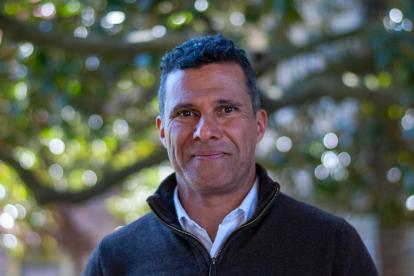
A Duke alumnus, Brian McAdoo, Ph.D., came back to Duke in 2021 as an associate professor of Earth and climate sciences with the Nicholas School of the Environment. A marine geologist by training, McAdoo’s roles at the university include principal investigator of the PlanetLab, which looks at how human development is damaging Earth systems that support life and the ways resulting disasters disproportionately affect marginalized communities. While he was born and raised in Pittsburgh, Pa., he has deep family roots in Greensboro.
I’ve worked at DGHI…
since Fall 2024 as an affiliate faculty. I’m also the director of undergraduate studies for the earth and climate science major, and I teach a course on experiential learning in Earth sciences and on disaster risk.
The most rewarding part of my work is…
is having access to the best and brightest young minds who are dedicated to addressing an array of planetary health challenges.
I feel passionate about …
the need to focus resources on the communities that need them the most- those marginalized by race, gender, religion, economics, politics, and the like. Also, I am a disaster researcher with projects in Nepal, Pakistan, Madagascar, Brazil and North Carolina.
The most memorable experience I’ve had through my job…
was watching my Ph.D. student from a rural part of the Pakistani Himalayas interact with Nepalis in rural mountain communities that share a common understanding of the challenges they face in a rapidly changing environment.
If I’m not working, I am likely…
eating street food across Asia, out on my bike or walking in the woods with my dog.
What I value most about DGHI:
is being able to collaborate with a diversity of people approaching an array of critical issues using a variety of impressive tools.